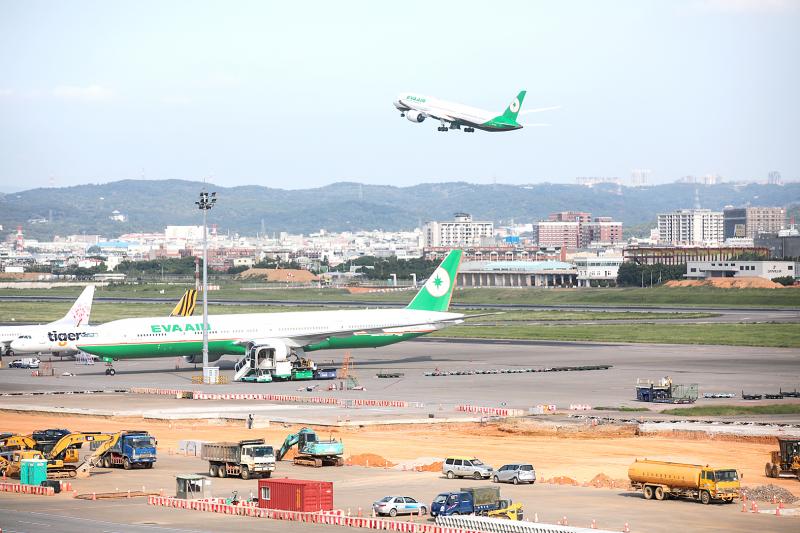EVA Airways Corp (長榮航空) yesterday said it would change its boarding processes due to the COVID-19 pandemic, increasing social-distancing measures without sacrificing efficiency.
After the carrier in the past three months tried several boarding methods and researched other airlines’ practices, EVA said it would adopt a window-to-aisle method for its wide-body aircraft and half-block method for its narrow-body jets.
The new boarding procedures would only apply to economy-class passengers, as the airline would still give boarding priority to those with business-class tickets, disabled passengers, pregnant women and babies, EVA told the Taipei Times by telephone.

Photo: Cheng I-hwa, Bloomberg
For its wide-body jets, which have 3-3-3 or 3-4-3 seating configurations, passengers sitting near the windows on two sides of the airplane would board first, followed by passengers with seats between the aisles, EVA said, adding that this would reduce the chances of passengers interacting with each other.
As for its narrow-body jets with 3-3 seating configurations, the airline said it would let passengers with seats on one side of the airplane in the rear and those on the other side in the front board first.
Calling the procedure “diagonal” boarding, EVA said that the method would allow passengers to place their carry-on bags in the overhead compartments without interacting with others.
The new boarding methods would reduce passengers’ boarding time, the airline said, adding that boarding for a Boeing 777-300ER with 350 passengers would decline from 25 minutes to 20 minutes, while the boarding time for a fully loaded Airbus A321-200 jet would drop by three minutes.
“The boarding methods are here to stay even after the COVID-19 outbreak ends,” EVA said.

TECH BOOST: New TSMC wafer fabs in Arizona are to dramatically improve US advanced chip production, a report by market research firm TrendForce said With Taiwan Semiconductor Manufacturing Co (TSMC, 台積電) pouring large funds into Arizona, the US is expected to see an improvement in its status to become the second-largest maker of advanced semiconductors in 2027, Taipei-based market researcher TrendForce Corp (集邦科技) said in a report last week. TrendForce estimates the US would account for a 21 percent share in the global advanced integrated circuit (IC) production market by 2027, sharply up from the current 9 percent, as TSMC is investing US$65 billion to build three wafer fabs in Arizona, the report said. TrendForce defined the advanced chipmaking processes as the 7-nanometer process or more

China’s Huawei Technologies Co (華為) plans to start mass-producing its most advanced artificial intelligence (AI) chip in the first quarter of next year, even as it struggles to make enough chips due to US restrictions, two people familiar with the matter said. The telecoms conglomerate has sent samples of the Ascend 910C — its newest chip, meant to rival those made by US chipmaker Nvidia Corp — to some technology firms and started taking orders, the sources told Reuters. The 910C is being made by top Chinese contract chipmaker Semiconductor Manufacturing International Corp (SMIC, 中芯) on its N+2 process, but a lack

Who would not want a social media audience that grows without new content? During the three years she paused production of her short do-it-yourself (DIY) farmer’s lifestyle videos, Chinese vlogger Li Ziqi (李子柒), 34, has seen her YouTube subscribers increase to 20.2 million from about 14 million. While YouTube is banned in China, her fan base there — although not the size of YouTube’s MrBeast, who has 330 million subscribers — is close to 100 million across the country’s social media platforms Douyin (抖音), Sina Weibo (新浪微博) and Xiaohongshu (小紅書). When Li finally released new videos last week — ending what has

NVIDIA PLATFORM: Hon Hai’s Mexican facility is to begin production early next year and a Taiwan site is to enter production next month, Nvidia wrote on its blog Hon Hai Precision Industry Co (鴻海精密), the world’s biggest electronics manufacturer, yesterday said it is expanding production capacity of artificial intelligence (AI) servers based on Nvidia Corp’s Blackwell chips in Taiwan, the US and Mexico to cope with rising demand. Hon Hai’s new AI-enabled factories are to use Nvidia’s Omnivores platform to create 3D digital twins to plan and simulate automated production lines at a factory in Hsinchu, the company said in a statement. Nvidia’s Omnivores platform is for developing industrial AI simulation applications and helps bring facilities online faster. Hon Hai’s Mexican facility is to begin production early next year and the